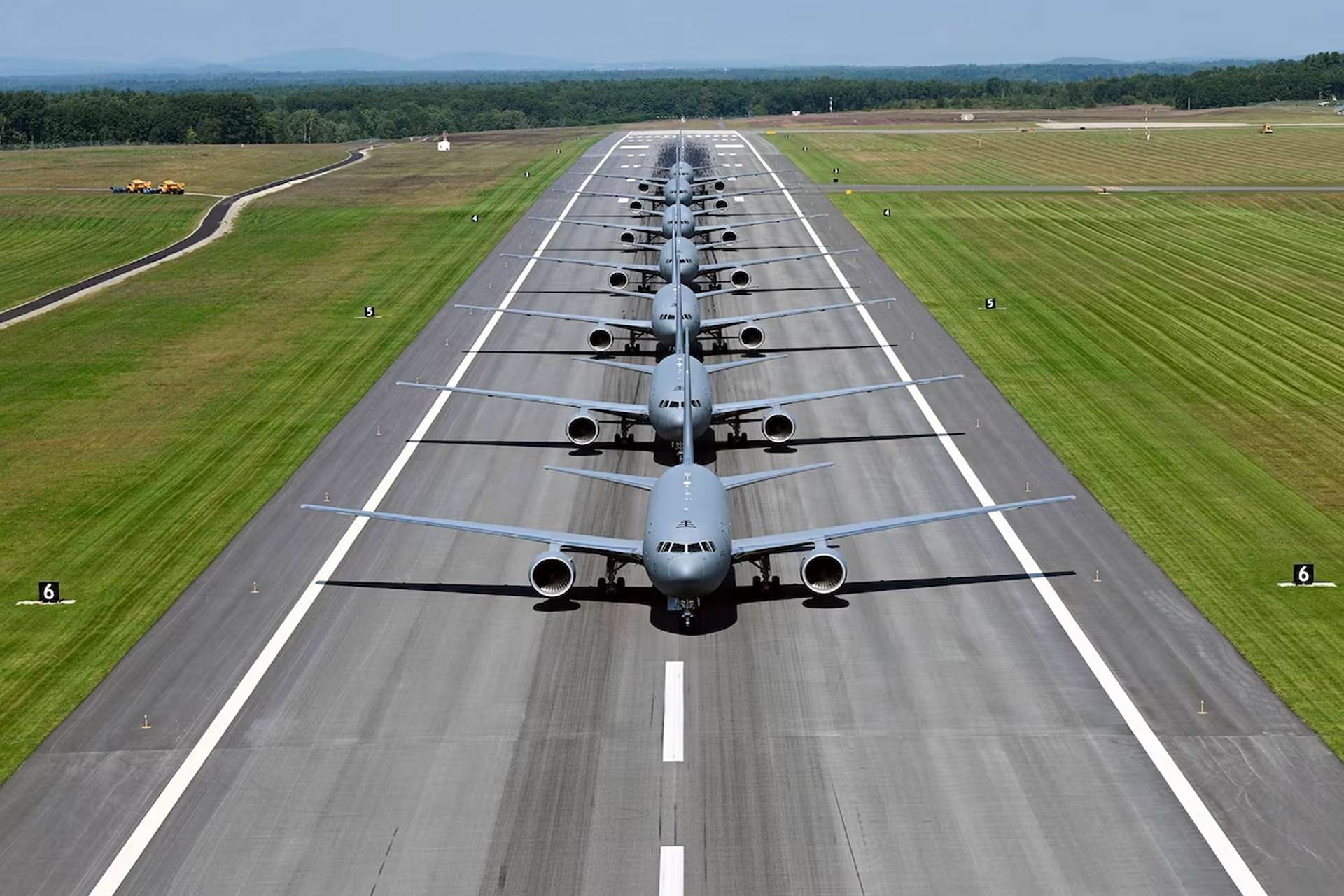US Air Force Awards Contract to Boeing to Boost KC-46A Tanker Aircraft’s Operational Capabilities

{loadposition bannertop}
{loadposition sidebarpub}
On 22 July, 2024, the U.S. Air Force announced the award of a substantial contract to Boeing, valued at $16.8 million, for enhancements to the software and data of the KC-46A, aimed at pushing the boundaries of performance and operational readiness of the world’s most advanced multi-mission tanker.Follow Army Recognition on Google News at this link
Boeing KC-46A Tanker Aircraft (Picture source: US DoD)
This new contract entails a crucial upgrade to the Onboard Performance Tool software, which will facilitate rapid mission launch. Improvements will focus on optimizing freight loading and managing takeoff and landing data, crucial for flight planning. These advancements will allow crews to perform weight and balance calculations more effectively and prepare the aircraft for missions with unmatched speed.
Lynn Fox, Vice President of KC-46 and Program Director, emphasized the significance of these innovations: “With the expanding fleet of KC-46As, the U.S. Air Force and our allies are undertaking critical global missions. We are committed to integrating these enhancements and delivering additional capabilities to the battlefield as quickly as possible to meet the changing needs of the missions.”
In addition to these software enhancements, in 2023, Boeing received a contract for the Block 1 upgrade of the KC-46A, which enhances the aircraft’s advanced communications, data connectivity, and situational awareness, thereby increasing the aircraft’s survivability and operational advantage in contested environments.
The KC-46A is already recognized for transporting three times more cargo pallets and twice as many passengers as the KC-135, which it is slated to replace, in addition to a more than 30% increase in its aeromedical evacuation capability.
The tanker also stands out for its secure communications and data integration, providing real-time situational awareness essential for the crew and fleet. These capabilities are transforming the traditional role of tankers and will further expand with the integration of the Advanced Battle Management System (ABMS).
In 2022, the KC-46A was approved for global combat operations by the U.S. Air Force Air Mobility Command (AMC), demonstrating connectivity and situational awareness described as “game-changing” by AMC leaders.
KC-46A aircraft are assembled on the 767 production line in Everett, Washington, supported by a supplier network of about 37,000 American workers from over 650 businesses across more than 40 states. To date, Boeing has delivered 69 KC-46As to the U.S. Air Force, four to the Japan Air Self-Defense Force, and is contracted to deliver four more to the Israeli Air Force.
The ongoing development of the KC-46A demonstrates Boeing’s commitment to innovation and support for global defense capabilities, adapting its aircraft to meet the contemporary challenges of military air operations.
The Boeing KC-46A Pegasus is a multi-role tanker aircraft based on the Boeing 767-200ER platform. Primarily designed for air refueling, the KC-46A incorporates advanced technologies such as a cockpit similar to the Boeing 787, an electronically controlled refueling boom, and a remote boom operator’s station. It is also equipped for medical evacuation missions, increasing its versatility across various operation theaters.
In terms of defense, the KC-46A is equipped with an advanced suite of large aircraft infrared countermeasures (LAIRCM), radar warning receiver (RWR), and enhanced tactical situational awareness. These technologies are essential for operating in hostile environments and for relaying communications, while also being hardened against nuclear, chemical, and biological threats.
The KC-46A program began with a prototype flight in December 2014, and the first delivery took place in January 2019. The initial plan called for the production of 179 aircraft to replace part of the USAF’s KC-135R fleet. However, program delays have postponed full-rate production, originally planned for Lot 3, to Lot 10, with Fiscal Year 2023 funding intended for the purchase of 15 additional tankers.
Operationally, the KC-46 has demonstrated impressive refueling capacity, with a fuel transfer capability of up to 207,672 pounds via the boom and the ability to accommodate 58 patients in its medical evacuation configuration. It can also transport 58 passengers or up to 114 in contingency operations, and its cargo load capacity reaches 65,000 pounds across 18 pallet positions. These features underscore its critical role in logistical and operational support on a global scale.

{loadposition bannertop}
{loadposition sidebarpub}
On 22 July, 2024, the U.S. Air Force announced the award of a substantial contract to Boeing, valued at $16.8 million, for enhancements to the software and data of the KC-46A, aimed at pushing the boundaries of performance and operational readiness of the world’s most advanced multi-mission tanker.
Follow Army Recognition on Google News at this link
Boeing KC-46A Tanker Aircraft (Picture source: US DoD)
This new contract entails a crucial upgrade to the Onboard Performance Tool software, which will facilitate rapid mission launch. Improvements will focus on optimizing freight loading and managing takeoff and landing data, crucial for flight planning. These advancements will allow crews to perform weight and balance calculations more effectively and prepare the aircraft for missions with unmatched speed.
Lynn Fox, Vice President of KC-46 and Program Director, emphasized the significance of these innovations: “With the expanding fleet of KC-46As, the U.S. Air Force and our allies are undertaking critical global missions. We are committed to integrating these enhancements and delivering additional capabilities to the battlefield as quickly as possible to meet the changing needs of the missions.”
In addition to these software enhancements, in 2023, Boeing received a contract for the Block 1 upgrade of the KC-46A, which enhances the aircraft’s advanced communications, data connectivity, and situational awareness, thereby increasing the aircraft’s survivability and operational advantage in contested environments.
The KC-46A is already recognized for transporting three times more cargo pallets and twice as many passengers as the KC-135, which it is slated to replace, in addition to a more than 30% increase in its aeromedical evacuation capability.
The tanker also stands out for its secure communications and data integration, providing real-time situational awareness essential for the crew and fleet. These capabilities are transforming the traditional role of tankers and will further expand with the integration of the Advanced Battle Management System (ABMS).
In 2022, the KC-46A was approved for global combat operations by the U.S. Air Force Air Mobility Command (AMC), demonstrating connectivity and situational awareness described as “game-changing” by AMC leaders.
KC-46A aircraft are assembled on the 767 production line in Everett, Washington, supported by a supplier network of about 37,000 American workers from over 650 businesses across more than 40 states. To date, Boeing has delivered 69 KC-46As to the U.S. Air Force, four to the Japan Air Self-Defense Force, and is contracted to deliver four more to the Israeli Air Force.
The ongoing development of the KC-46A demonstrates Boeing’s commitment to innovation and support for global defense capabilities, adapting its aircraft to meet the contemporary challenges of military air operations.
The Boeing KC-46A Pegasus is a multi-role tanker aircraft based on the Boeing 767-200ER platform. Primarily designed for air refueling, the KC-46A incorporates advanced technologies such as a cockpit similar to the Boeing 787, an electronically controlled refueling boom, and a remote boom operator’s station. It is also equipped for medical evacuation missions, increasing its versatility across various operation theaters.
In terms of defense, the KC-46A is equipped with an advanced suite of large aircraft infrared countermeasures (LAIRCM), radar warning receiver (RWR), and enhanced tactical situational awareness. These technologies are essential for operating in hostile environments and for relaying communications, while also being hardened against nuclear, chemical, and biological threats.
The KC-46A program began with a prototype flight in December 2014, and the first delivery took place in January 2019. The initial plan called for the production of 179 aircraft to replace part of the USAF’s KC-135R fleet. However, program delays have postponed full-rate production, originally planned for Lot 3, to Lot 10, with Fiscal Year 2023 funding intended for the purchase of 15 additional tankers.
Operationally, the KC-46 has demonstrated impressive refueling capacity, with a fuel transfer capability of up to 207,672 pounds via the boom and the ability to accommodate 58 patients in its medical evacuation configuration. It can also transport 58 passengers or up to 114 in contingency operations, and its cargo load capacity reaches 65,000 pounds across 18 pallet positions. These features underscore its critical role in logistical and operational support on a global scale.





